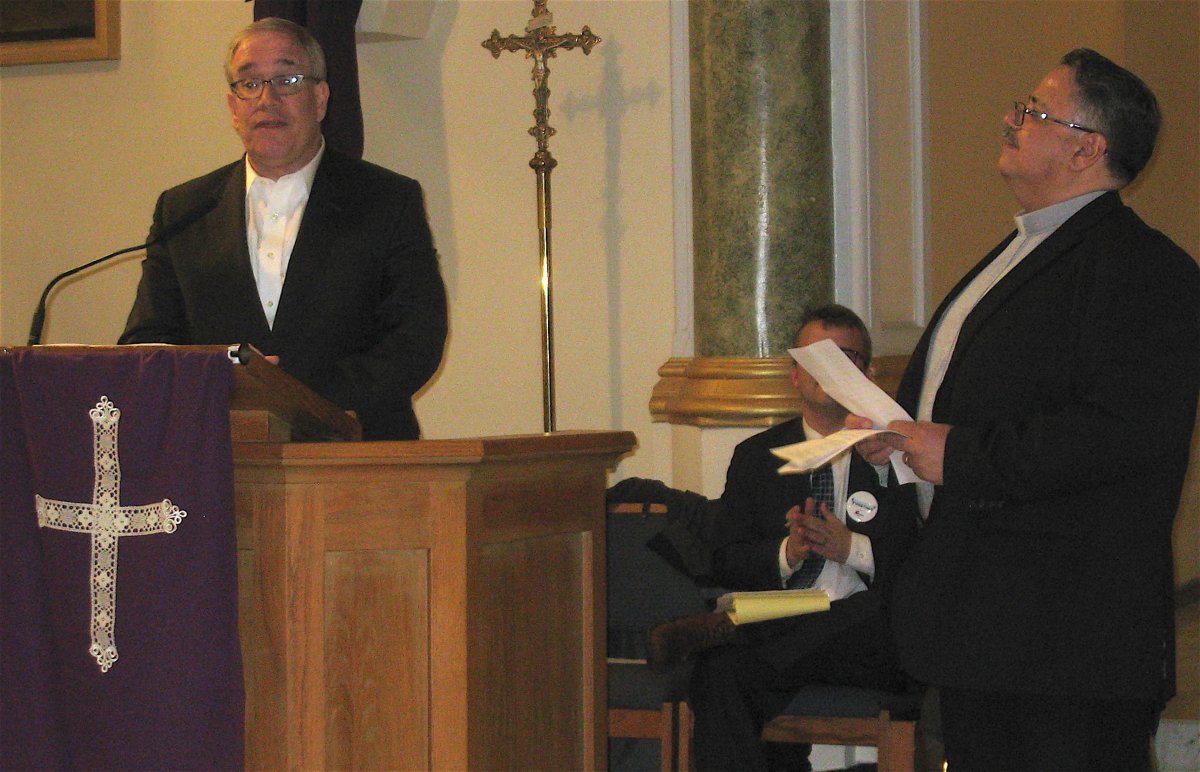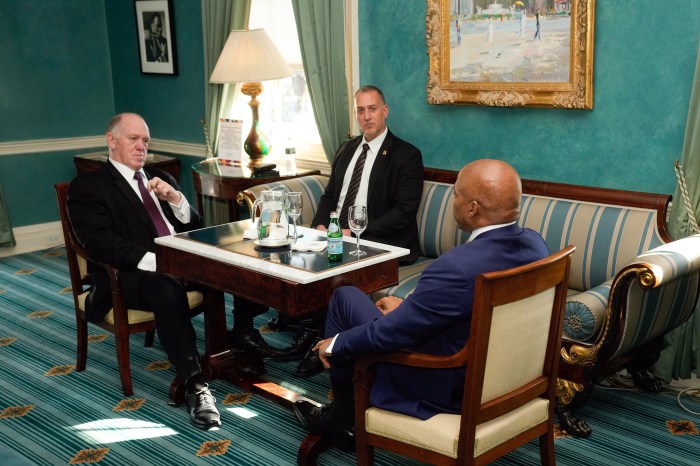
BY LESLEY SUSSMAN | The New York City Housing Authority and Department of Education came under sharp criticism Sunday at a Manhattan Together assembly held at Our Lady of Sorrows Roman Catholic Church attended by around 500 people.
Seated in the audience at the church, at 103 Pitt St., were representatives of various community organizations, churches, synagogues and mosques, and a large turnout of public housing residents, parents and immigrants. The keynote speaker at the afternoon session was City Comptroller Scott Stringer.
The gathering was organized by Manhattan Together, an organization of citizens, and aspiring citizens, from dues-paying congregations in Manhattan. The group’s purpose is to organize people from member institutions to push for progress on important local issues.
Speakers at the meeting not only outlined the shortcomings of various city agencies, but asked Stringer and other elected officials how they would help.
Stringer promised the assembly that he would double his efforts to push D.O.E. to fix its Special Education Student Information System (SESIS), which, the schools agency claims, has been filled with glitches. Last year the agency announced a working group to fix its system, which, it said, does not allow D.O.E. to track services accurately. The comptroller said this has cost the city millions of dollars in missed Medicaid reimbursements.
Stringer added that he wants to increase the accountability and funding of NYCHA and to help immigrants and the homeless build a power base.
“I have already conducted eight audits of the New York City Housing Authority in the years that I’ve been in office, which is more than any other comptroller has done,” he said. “The New York City Housing Authority must be fixed, so residents can enjoy their housing and more poor people can find a place to live in.”
Stringer said he wants to see $400 million in untapped funds from the Battery Park City Authority allocated to NYCHA over the next 10 years. Turning to D.O.E., the comptroller noted that he is a parent of two young children.
“We have to make sure that every child of any age and all abilities can have the opportunity to learn and be properly educated,” he said. “I stand with you, today, in fixing a system that only helps kids who have the resources to do well.”
In his welcoming remarks, Father Thomas Faiola, pastor of Our Lady of Sorrows, blasted NYCHA.
“Many apartments are in disrepair,” he said, “and there’s not adequate housing for the poor and immigrant population. We’ve made some progress, but huge challenges remain that need to be addressed to make public housing better.”
Melissa Bracero, a NYCHA resident, told the audience a heart-rending story of how her aunt became seriously ill because of mold in her apartment that the housing authority could not fix.
“The mold problem got so bad, my grandmother couldn’t sleep in her bedroom,” she said. “NYCHA cleaned up the mold but it came back. They tried, again, with no success. They still have not found out what is causing the mold.”
Reverend Getulio Cruz, pastor of Monte Sion Christian Church, at 297 E. Third St., angrily backed up her remarks.
“We want NYCHA to fix mold problems within seven to 15 days,” Cruz said. “There’s been some progress in them doing that. But the problem keeps recurring in about 30 percent or more of the apartments. We want the agency to resolve mold problems permanently.”
Hope Baker, a member of the East End Temple, at 245 E. 17th St., told the gathering about the poor performance of D.O.E. She said that her son, a special-needs student, was not getting the help he needed.
“The D.O.E. admits that over 40 percent of special-needs students are not getting the services they have a legal right to. This is a crisis,” she said. “Their tracking system doesn’t work.”
“This isn’t just about software, and it’s not just about long-term planning,” Stringer answered. “It’s about kids who for years are not getting the support they need because the Special Education Student Information System has flaws.”
Father Sean McGillicuddy, a pastor at Most Holy Redeemer-Nativity Church, at 173 E. Third St., spoke about the ballooning homeless crisis.
“Many homeless people I have spoken to would rather live on the streets than go into these unsafe shelters,” he said. “We need to give more help to the 60,000 homeless people living on the streets of this city.”
Jairo Guzman, from the Mexican Coalition for The Empowerment of Youth and Families, said hate crimes are rising in the city against Latinos, Muslims and Jews — particularly, Muslim immigrants.
“They are afraid to report crimes against them to the police,” he said. “We must educate them to their rights, so they no longer need live in fear.”
The meeting also heard from Rabbi Beni Wajnberg of Temple Shaaray Tefila, on the Upper East Side, who echoed the gathering’s message of unity.
“We’re gathered here to make our neighborhoods safer,” he said, “and to work together regardless of our backgrounds of religions.”





































